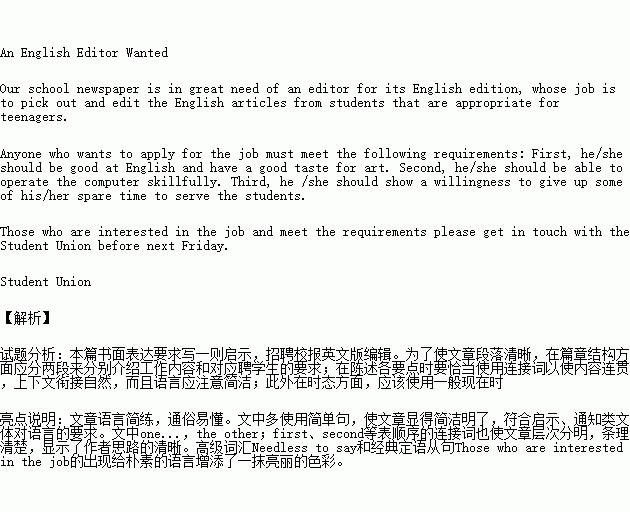题目内容
假设你是学生会主席李华,学生会打算招募一位校报英文版的编辑,请你用英文以 “An English Editor Wanted”为题目写一则招聘启事。内容要点如下:
1、要求:英文与美术皆好;能熟练使用电脑;
2、工作内容:选择与编辑同学们的英文来稿;
3、有意者请在下周五前与学生会联系。
注意:1.词数100左右
2.不要逐字翻译,可适当发挥。
An English Editor Wanted
_______________________________________________________________________________
_______________________________________________________________________________
_______________________________________________________________________________
_______________________________________________________________________________
_______________________________________________________________________________
_______________________________________________________________________________
_______________________________________________________________________________
_______________________________________________________________________________
_______________________________________________________________________________
_______________________________________________________________________________
Body language is an important part of communication(交流). If you want to communicate well, it's important to understand how you can (and can't) use your body to say what you mean, especially when you're in a foreign country. If a person is bored, he won't look at the person who is talking to him. He will find other things to do. He may also keep looking at his watch or a clock. If a person is open to you, his arms and legs will not be crossed. And if a person is relaxed, you will know it by looking at his body, even his breathing is slower.
Here are some examples of body language:
Body language | Feeling |
Sitting with legs crossed | Bored |
Sitting with legs apart | Open, relaxed |
Walking with hands in pockets, head down | Sad |
Hand to cheek | Thinking things in hands |
clasped (握紧) behind back | Angry |
1.What can you do if you want to communicate well?
A. Walk with hands in pockets.
B. Use body language to say what I mean.
C. Speak in public.
D. Say something slowly.
2.If a person is ________, he won't look at the person who is talking.
A. boredB. tiredC. happyD. open
3.If a person is relaxed, ________.
A. he will find other things to look at
B. he will speak louder
C. his breathing will be slower
D. his breathing will be quicker
4.What's the best title for the passage?
A. CommunicationB. Body Language
C. Some FeelingsD. Health

